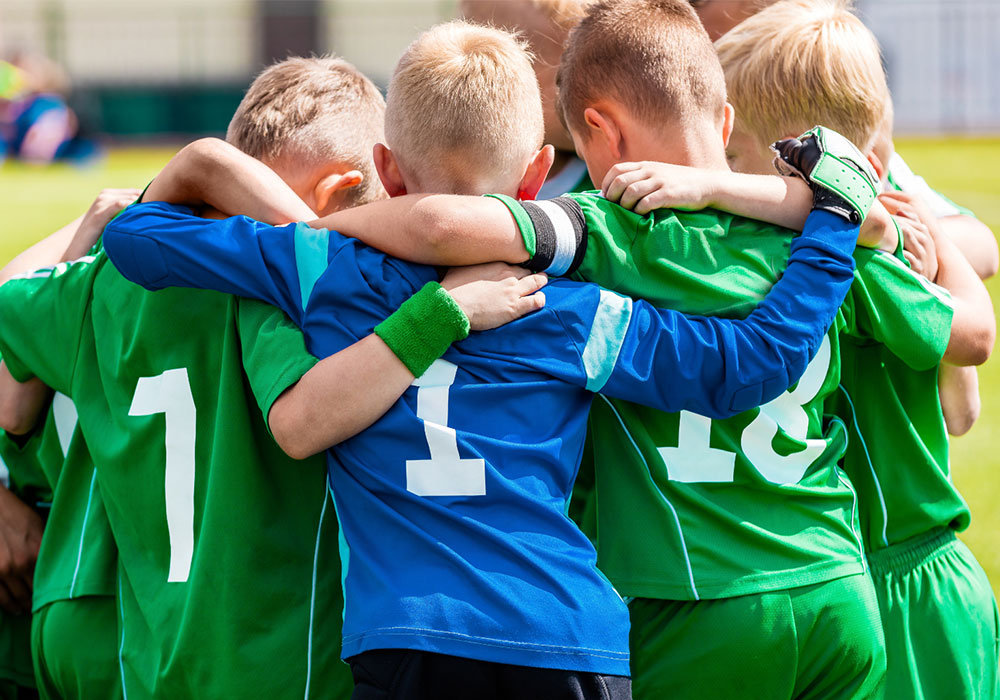How Can Better Social Relationships Help Prevent Childhood Obesity and Reduce Anxiety?

Have you ever considered how you and your child’s social relationships may be affecting all your family’s eating and physical activity habits and hence your body size? Equally their body size may affect how they connect with others.
It’s a bit of a chicken and an egg situation, but considering what your child eats, how they move, and how they interact socially, could be a game changer for their physical and mental health.
In this blog post we’ll look at the impact of isolation (disconnection) and poor social relationships, as well as technology and sedentary behaviour on your child’s health.
How do screens cause weight gain?
Does this sound familiar?
The kids are back from school and are tired, they immediately grab the iPad, or switch on the TV.
They open the pantry to grab a snack. Desperate to get back to their screens they reach for the sugary drinks, popcorn, lollies, chips, cookies etc. Kids like things to be easy so they will naturally grab something which doesn’t require any preparation so they can immediately get back to their gaming or TV show. It’s like any unhealthy behaviour, they are opting for short term pleasures over positive healthy choices.
Of course, iPads, play station’s etc can help kids to connect with their friends virtually; but if you’ve ever witnessed kids playing on screens together versus kicking a ball, playing tip or shooting hoops, you’ll see the type of social connection is quite different.
When kids play together outside inspired by the wonders of nature, their self-esteem is high and their anxiety is low. They are connecting with friends in a light-hearted way. When they’re laughing and being playful, they are relaxed and happy.
Kids need to move!
It’s part of what makes us human, we all need to move. Here are just some of many the reasons why:
- Physical activity contributes to better mental and physical health
- It also helps build strong bones and muscle – important for growing children
- Being fit and active, whatever your age, also reduces the risk of developing heart disease, cancers and diabetes.
- Exercising outside in the natural environment allows kids to develop their social skills and friendships, as well as learning about teamwork and cooperation.
Mental health and obesity
But sadly, in today’s tech-obsessed culture we are more and more disconnected from ourselves. Just look at the facts, there’s a global epidemic of obesity. In Australia, according to the Australian Bureau of Statistics, approximately 25% of children aged 5-17 are overweight.
Of course, there are genetic and physical causes of obesity, but the emotional and mental aspects are huge. It’s a negative cycle, the worse you feel about yourself the less you care, and the less you care the worse lifestyle choices you make.
How does disconnection cause obesity?
- Maybe your child is being bullied at school?
- Are they feeling isolated from friends?
- Or are they anxious from playing computer games late into the night?
It’s well known that some people eat for comfort.
Not only do these factors cause children to make bad food choices, but it can also affect both their sleep and hormones.
Isolation and disconnection can trigger the stress hormone, cortisol to go into overdrive. Excessive cortisol is linked to hunger and fat production which in turn leads to weight gain. The cycle continues as this child feels unhappy and becomes more sedentary as carrying the excess weight makes physical activity increasingly difficult.
What can I do about this?

- Check in with your child. From a social and mental health perspective, it’s important that you pay attention to changes in their behaviour.
- Open communication – be honest with your child. Ask them how they feel about physical activity and healthy foods and support them with new behaviours and food choices.
- Model healthy eating yourself.
- Family meals are a great way to connect with your child and make sure everyone is eating healthy meals together.
- Be consistent, do not give in to their constant requests for screen time and sugary/processed snacks.
- Always be positive about new healthy food choices.
- Seek family experiences and holidays together in your local park, beach, riverside or mountain.
Five easy ways to get your child moving
It’s recommended that kids aged 5-17 do at least an hour of moderate to high intensity exercise every day. This sounds great in theory, but after school activities are not cheap. Here are some ways to help your child get moving without stretching the wallet.
- Be sure to encourage school sport, and make sure they have the correct uniform to minimise any possible embarrassment.
- Community sporting activities don’t need to be expensive. Seek out a local soccer, cricket, netball, football etc club which doesn’t cost the earth. The NSW Government’s Active Kids vouchers can help ease the financial strain too. See what’s available in your state.
- Head to the beach, local park or recreation centre with your kids.
- Community events, such as fun-runs are a great way to get the whole family involved.
- Be firm with your boundaries! Restrict screen time to specific times and stay consistent.
Help your kids build social relationships today
At Childhood Obesity Prevention, we understand how challenging it can be to help your kids build social relationships. If you have concerns about the choices you are making as a family, and their impact on your health, we are here to help. We have a range of support options available to suit your family, from self-guiding your journey to healthier habits with our book Ride to Life, through to personal consultations.
